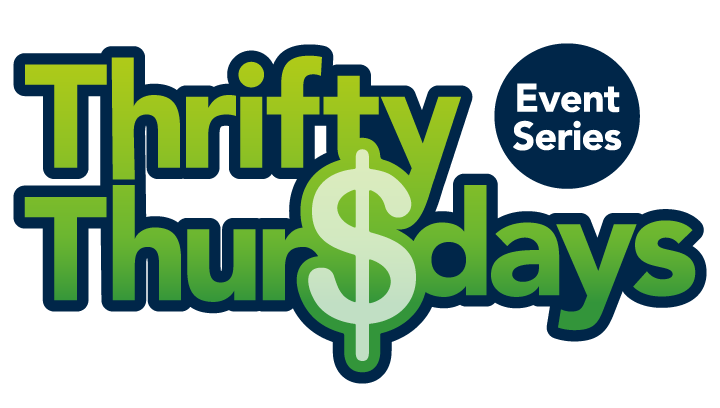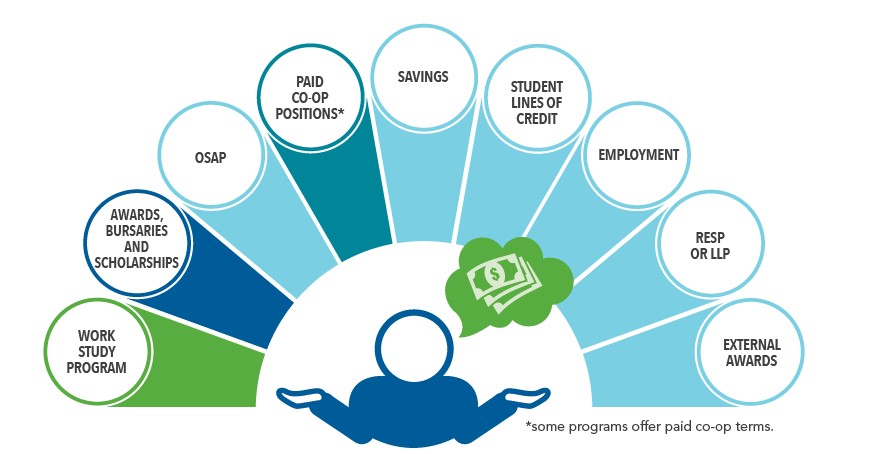Budgeting tips and tricks
You can afford this! Congratulations on taking the step to invest in your dream and yourself. Paying your way to graduation isn’t as difficult as you may think. Here are some helpful resources to help you prepare financially.
Attend our Thrifty Thursdays
Financial Aid and Awards presents Thrifty Thursdays, a series of workshops to help you stay on track financially.
We have even MORE rewards to help you learn AND save!
Workshop Draws
For anyone who attends the full workshop and fills out the feedback form within 1 hour of the workshop, will be entered in a draw for a $100 PC grocery gift card.* Draws will be 2 hours after the workshop and successful recipients will be notified by email!
*Read official contest rules and regulations
Semesterly Rewards
Attend four workshops in a semester to:
- be entered for a chance to win $250 on your ONEcard each semester**,
- receive a Financial Literacy badge to display on LinkedIn, and
- receive a Financial Literacy co-curricular record.

Upcoming workshops
Fall 2025
Co-presented by: Canadian Foundation for Economic Education (CFEE)
Thursday, Sept. 4 from 12:30 to 1:30 p.m.
Thursday, Sept. 18 from 12:30 to 1:30 p.m.
Guest speaker: Jonny Somers-Harris, BA, Comm, Prime Time Financial Inc.
Thursday, Oct. 2 from 12:30 to 1:30 p.m.
Guest speaker: Jonny Somers-Harris, BA, Comm, Prime Time Financial Inc.
Thursday, Oct. 16 from 12:30 to 1:30 p.m.
Guest speaker: Ryan Burwell, Henry Bernick Entrepreneurship Centre (HBEC)
Thursday, Oct. 30 from 12:30 to 1:30 p.m.
Co-presented by: Canadian Foundation for Economic Education (CFEE)
Thursday, Nov. 13 from 12:30 to 1:30 p.m.
Ready, Set File: International Taxes
Guest speaker: Maria Mejia, Your Financial Success Matrix
Thursday, Nov. 27 from 12:30 to 1:30 p.m.
Winter 2026
Co-presented by: Canadian Foundation for Economic Education (CFEE)
Thursday, Jan. 8 from 12:30 to 1:30 p.m.
Living a Financially Healthy Life
Co-presented by: Canadian Foundation for Economic Education (CFEE)
Thursday, Jan. 15 from 12:30 to 1:30 p.m.
Guest speaker: Mike Woods, CLU, CH.F.C, CHS, BeaconPoint FS Ltd.
Thursday, Jan. 29 from 12:30 to 1:30 p.m.
Presented by: Robert Kilner, CIRP, LIT, Spergel Corporate
Thursday, Feb. 12 from 12:30 to 1:30 p.m.
Presentation provided by: National Student Loans Service Centre (NSLSC)
Thursday, Feb. 26 from 12:30 to 1:30 p.m.
*Funding Your First Year
Thursday, Mar. 19 from 12:30 to 1:30 p.m. or
Thursday, May 7 from 6 to 7 p.m.
Guest speaker: Jonny Somers-Harris, BA, Comm, Prime Time Financial Inc.
Thursday, Mar. 26 from 12:30 to 1:30 p.m.
Filing Frenzy: Navigating Tax Time
Guest speaker: Maria Mejia, Your Financial Success Matrix
Thursday, Apr. 2 from 12:30 to 1:30 p.m.
*Both Funding Your First Year workshops will not be eligible for the semesterly rewards and attendance is not counted*
Figure out your sources of funding
We know many students find it tough to make ends meet, which is why we offer so many services and supports to help you pay from start to finish including:
- Entrance awards during the admission stage
- Ontario Student Assistance Program (OSAP)
- In-course awards during your studies
- Work Study Program (on-campus jobs)
There are other sources of funding for you to explore including:
- Savings: Plan to save for school including possible contributions from family.
- Student Lines of Credit: These are lines of credit offered by financial institutions specifically designed for students.
- Employment: Plan to work while studying or during any break terms.
- RESP: The Registered Education Savings Plan (RESP) is a tax-sheltered education savings account.
- LLP: The Lifelong Learning Program allows you to use money from your RRSPs without tax implications.
- External awards: Many companies and organizations offer awards to college-bound students.

Know your costs
It is important to know what your costs are, so that you can plan and budget to pay for them. Whether you’re living at home or away from home, can have a huge impact on your budget. Typical costs would include:
- Tuition and ancillary fees: Plan ahead and be sure to check your specific program costs. Also, know the fee deadlines.
- Books and supplies: Check with your program about anticipated costs for your program. Don’t underestimate the tools you will need to buy.
- Transportation: Your student card is a your bus pass. For those in placements or co-op, consider that you may need to allocate more travel costs. There may not be any guarantee that your placement is in the same city as your program. If you drive, you will need to figure out your car payments, insurance, gas, maintenance, and parking expenses.
- Residence or housing: Unless you are living at your family’s home for no expense, housing will be a considerable cost. Be sure to check with our housing resources for assistance. Be sure to include insurance (even for a rental).
- Food: Be sure to be realistic about your food budget, meal plan and shop around to save.
- Other expenses could include:
- Utilities (natural gas, electricity, water)
- Phone, cable, internet
- Child care costs
Plan your budget
Need help with budgeting? Check out our “My Budget” tool on MyGCLife.ca – manage your money
more effectively, save for expenses and prepare for emergencies.
The budget template includes educational expenses, housing, food, transportation, miscellaneous costs and health insurance, as well as sources of income from scholarships, grants, bursaries, RESP, loans, OSAP and work. The template is intuitive and easy to understand.
Contact us
Financial Aid and Awards provides a centralized service located at the Barrie Campus within the Office of the Registrar.
Please note, all Financial Aid and Awards services are available both in person and remotely.
Email: financialaid@georgiancollege.ca
Fax: 705.722.5136
In-person office hours: Monday to Friday, 8:30 a.m. to 4 p.m.
Virtual service hours: Monday to Friday, 8:30 a.m. to 4:30 p.m.